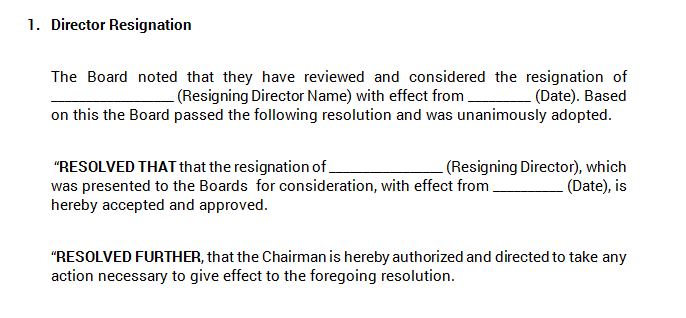A board meeting is a formal gathering of a Board of Directors. Most of the organizations, being public or private, profit or non-profit, are ultimately governed by a body commonly known as Board of Directors. The members of this body cyclically meet to discuss strategic matters.
A director may resign from his office by giving a notice in writing to the company. Hence, the Board shall on receipt of such notice take note of the same and the company shall intimate the Registrar in such manner. The Registrar should be informed within such time and in such form as may be prescribed and shall also place the fact of such resignation in the report of directors laid in the immediately following general meeting by the company.

Thus, review your Board Meeting Minutes immediately after the meeting. When your board meeting minutes are complete and finished, make sure they are distributed to board members as soon as possible. Once the minutes are approved by a vote of the members during the board meeting, they become part of the official record of the organization. It’s important that a copy of all minutes are kept in one place.
FAQs
As per the provisions of section 168 of Companies act 2013, no right has been given to any managerial person to reject the resignation given by Directors.
Under the Corporations Act, directors of public companies are appointed by the shareholders of the company to act on their behalf. Therefore only shareholders can remove these Directors. In proprietary companies, a Director may be removed by a majority of Directors if the constitution allows it.
If there is a breach of Director duties, it is usually the company itself which takes action. In some instances, one or more shareholders can make a claim against a Director if they have suffered personal financial loss or damage, or they believe that other Directors may prevent a claim being made by the company.

